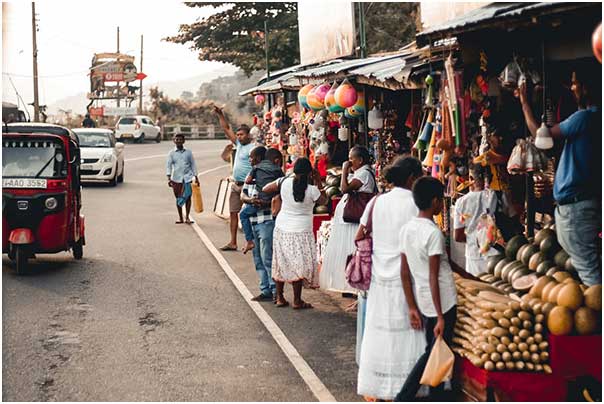Sri Lanka Faces Major Challenges on UN’s 2030 Development Agenda

BANGKOK, Thailand, Sep 04 (IPS) - On the road to sustainable development, Sri Lanka provides an interesting case study. Having overcome a three-decade domestic conflict, Sri Lanka has begun its transformation towards a sustainable and resilient society. The extreme poverty rate ($1.90 a day) dropped to 0.8 per cent in 2016. The unemployment rate is below 5 per cent since 2010.
Free education and health policies have resulted in high youth literacy rates (98.7 per cent) and high life expectancy (75 years). Measured by its index of human development, Sri Lanka is a high achiever.
However, Sri Lanka still faces major challenges. Improving the quality and relevance of education, providing medical treatment and care facilities for the ageing population, and fighting climate disasters call for further policy support, financial mobilization and partnership strengthening.
Government initiatives to mainstream Sustainable Development Goals (SDGs)
Sri Lanka has been incorporating the SDGs into its national policy framework. Since the endorsement of the 2030 Agenda for Sustainable Development, Sri Lanka has taken several momentous initiatives.
The most important one is the Sustainable Development Act in 2017, which establishes the legal framework to implement the SDGs with improved institutional and policy coherence. Under this Act, the Sustainable Development Council has been established, which formulates related national policies and guides new development projects.
From increasing investment to raising investment efficiency
Investments needed to achieve the SDGs are huge, but not beyond reach. Preliminary estimates by ESCAP suggest that Sri Lanka needs an annual additional investment of 4.4 per cent of the 2018 GDP through 2030 to provide a social protection floor (1.7 per cent), poverty gap transfers (0.2 per cent), quality education (1.6 per cent) and climate-resilient infrastructure (0.8 per cent).
Some of these investment needs have been mainstreamed into the Sri Lankan Government's budgets. For example, the Budget 2019 focuses on:
- Quality education by reforming curricula to enable the combination of Science, Technology, Engineering, Math and the Arts (STEM + A), enhancing continuous professional training for teachers, and introducing more technology in education delivery;
- Healthcare services and facilities by enhancing investments in healthcare delivery, quality and infrastructure;
- Agriculture by linking smallholder farmers to value chains of larger enterprises, investing in climate-proof warehousing, and enhancing natural disaster insurance for farmers;
- Climate resilience by improving irrigation infrastructure quality, strengthening eco-system conservation, and expanding natural disaster insurance scheme; and
- Gender equality by sharing costs of maternity benefits, facilitating childcare services by businesses and schools, and encouraging participation of women on corporate boards.
Despite the Government's initiatives, financing the SDGs remains a challenge. Relatively low level of tax revenue constrains Sri Lanka's domestic resource mobilization.
The country's access to concessionary finance (e.g. ODA) has declined given its elevation to middle-income status. Its export earnings and foreign direct investment (FDI) inflows have remained below potential.
Various measures have been taken to attract FDI and boost export earnings including implementation of a new National Export Strategy and easing business environment by digitalizing company registration and land registry.
In addition to these measures, improving investment efficiency is critical. ESCAP estimates that the developing Asia-Pacific countries can achieve similar levels of outputs and outcomes in health and education sectors using 30 per cent fewer resources. Among its peer countries, Sri Lanka performs well in health and education sectors; however, its investment efficiency in infrastructure could be improved.
To enhance infrastructure investment efficiency for the public sector, public financial management institutions – notably project appraisal, selection and management – need to be strengthened.
Effective coordination among different government branches for construction permits, environmental clearance and land acquisition is important, as these processes often lead to project delays.
Ensuring a steady flow of resources for operations and maintenance is a necessary condition for success. Good maintenance generates substantial savings, reducing the total lifecycle costs of infrastructure projects.
Multi-stakeholder partnerships
Raising awareness among relevant stakeholders and building capacity of relevant institutions are necessary to achieve the SDGs. Developing multi-stakeholder partnerships provide much room for improvement in Sri Lanka to fully engage the general public and the private sector. An effective mechanism is needed for collaborative engagement in SDG implementation, from policy formulation to monitoring.
Furthermore, regional cooperation is an area with great potential that has not yet fully entered the SDG discourse in Sri Lanka. Regional cooperation in South Asia and the broader Indian Ocean economy can help Sri Lanka accelerate its SDG progress in several areas, including climate change, renewable energy transition and food security.
The 2030 Agenda provides a blueprint to achieve a more sustainable future for all. Sri Lanka's efforts in mainstreaming the SDGs into its national planning and budgeting are an interesting case for the rest of the Asia-Pacific region to learn - a country does not need to wait until it achieves economic affluence before tackling social well-being and environmental health. Developing countries should incorporate social and environmental goals into their path towards prosperity.
© Inter Press Service (2019) — All Rights ReservedOriginal source: Inter Press Service
 Global Issues
Global Issues